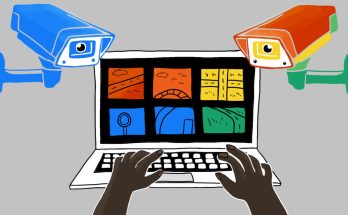JAKARTA, cssmayo.com – Blockchain Applications, initially designed as the backbone of cryptocurrency, has evolved into a powerful tool with diverse applications across various sectors. Its inherent characteristics—decentralization, transparency, and security—make it suitable for numerous use cases beyond digital currencies. In this article, we will explore several unexpected applications of blockchain technology, highlighting how it is transforming industries such as supply chain management, healthcare, finance, and more.
Understanding Blockchain Technology

Before diving into specific applications, it’s essential to understand what blockchain is. Fundamentally, a blockchain is a decentralized ledger that documents transactions across various computers. This decentralized nature ensures that no single entity has control over the entire network, making it resistant to tampering and fraud.
Key features of blockchain technology include:
- Decentralization: Eliminates the need for intermediaries, allowing peer-to-peer transactions.
- Transparency: All participants in the network can view the entire transaction history, fostering trust.
- Immutability: Once recorded, data cannot be altered or deleted, ensuring data integrity.
- Security: Cryptographic techniques secure transactions, making them difficult to hack or counterfeit.
Surprising Applications of Blockchain Technology
1. Supply Chain Management
One of the most promising applications of blockchain is in supply chain management. Traditional supply chains often suffer from inefficiencies, lack of transparency, and difficulty tracking products. Blockchain can address these issues by providing a secure and transparent way to track goods from origin to consumer.
Use Case Example: Walmart and IBM Food Trust
Walmart has partnered with IBM to use blockchain technology for food safety. By implementing the IBM Food Trust platform, Walmart can trace the origin of food products in seconds, significantly reducing the time needed to track contaminated products during recalls. This not only enhances food safety but also builds consumer trust in the supply chain.
2. Healthcare
The healthcare industry is increasingly recognizing the potential of blockchain to improve patient care, data management, and security. By securely storing patient records on a blockchain, healthcare providers can ensure that data is accessible only to authorized individuals while maintaining patient privacy.
Use Case Example: MediLedger
MediLedger is a blockchain-based platform that aims to enhance the pharmaceutical supply chain. It enables secure sharing of information among manufacturers, distributors, and pharmacies, helping to prevent counterfeit drugs and ensure compliance with regulations. The platform allows stakeholders to verify the authenticity of drugs, improving patient safety.
3. Digital Identity Verification
In an increasingly digital world, identity verification is crucial for preventing fraud and ensuring security. Blockchain technology can provide a secure and decentralized method for managing digital identities, allowing individuals to control their personal information.
Use Case Example: SelfKey
SelfKey is a blockchain-based identity management system that allows users to create and manage their digital identities securely. By using SelfKey, individuals can store their personal information on a blockchain, granting access only to trusted entities. This reduces the risk of identity theft and enhances privacy.
4. Voting Systems
Blockchain technology could fundamentally change voting systems by delivering a secure, transparent, and immutable way to cast and count votes. This could enhance the integrity of elections and increase voter confidence.
Use Case Example: Voatz
Voatz is a mobile voting platform that utilizes blockchain technology to enable secure voting for military personnel and overseas citizens. By allowing users to cast their votes via a mobile app, Voatz increases accessibility while ensuring that each vote is securely recorded on the blockchain, making it nearly impossible to alter or tamper with.
5. Real Estate
The real estate industry is often bogged down by paperwork, lengthy processes, and a lack of transparency. Blockchain can streamline transactions, reduce fraud, and enhance transparency in property ownership.
Use Case Example: Propy
Propy is a blockchain-based platform that facilitates real estate transactions by allowing buyers, sellers, and agents to complete transactions online. By using smart contracts, Propy automates the process of transferring property ownership, reducing the need for intermediaries and expediting the transaction process.
6. Intellectual Property Protection
Protecting intellectual property (IP) rights is a significant challenge in today’s digital landscape. Blockchain technology can provide a secure and transparent way to register and manage IP rights, ensuring that creators receive proper recognition and compensation for their work.
Use Case Example: Ascribe
Ascribe is a platform that allows artists and creators to register their digital works on the blockchain. By doing so, they can prove ownership and control the distribution of their creations. This helps prevent copyright infringement and ensures that creators receive royalties when their work is used or sold.
7. Energy Trading
The energy sector is undergoing a transformation with the rise of renewable energy sources. Blockchain technology can enable peer-to-peer energy trading, permitting consumers to buy and sell surplus energy directly among themselves.
Use Case Example: Power Ledger
Power Ledger is a blockchain-based platform that enables peer-to-peer energy trading. By allowing users to sell excess solar energy to their neighbors, Power Ledger promotes renewable energy use and empowers consumers to take control of their energy consumption.
8. Charity and Philanthropy
Transparency and trust are critical in the charity sector, where donors want to ensure their contributions are used effectively. Blockchain technology can enhance transparency by providing a clear record of how donations are spent.
Use Case Example: BitGive
BitGive is a nonprofit organization that uses blockchain technology to track donations and ensure they reach the intended recipients. By providing a transparent ledger of transactions, BitGive enhances trust between donors and charitable organizations, encouraging more contributions.
9. Gaming and Digital Assets
The gaming industry is increasingly leveraging blockchain technology to create unique digital assets, such as non-fungible tokens (NFTs). These assets can represent in-game items, characters, or even virtual real estate, providing players with true ownership.
Use Case Example: CryptoKitties
CryptoKitties is a blockchain-based game that allows players to buy, sell, and breed virtual cats represented as NFTs. Each CryptoKitty is unique and can be traded on the blockchain, giving players real ownership of their digital assets.
10. Insurance
The insurance industry can benefit from blockchain technology by streamlining claims processing and enhancing transparency. Smart contracts can automate claims payouts based on predefined conditions, reducing fraud and improving efficiency.
Use Case Example: Etherisc
Etherisc is a decentralized insurance platform that uses blockchain technology to automate the insurance process. By utilizing smart contracts, Etherisc can automatically process claims and payouts, making insurance more accessible and efficient for policyholders.
Challenges and Considerations
While the potential applications of blockchain technology are vast, several challenges must be addressed:
- Scalability: Many blockchain networks face scalability issues, limiting their ability to handle a large number of transactions quickly and efficiently.
- Regulatory Uncertainty: The regulatory landscape for blockchain technology is still evolving, leading to uncertainty for businesses looking to implement blockchain solutions.
- Interoperability: Different blockchain networks often operate in silos, making it challenging to share data and collaborate across platforms.
- User Adoption: For blockchain applications to succeed, users must understand and trust the technology. Education and awareness are crucial for encouraging adoption.
Conclusion: The Future of Blockchain Applications
Blockchain technology is more than just a foundation for cryptocurrency; it is a transformative force with the potential to revolutionize various industries. From supply chain management and healthcare to voting systems and digital identity verification, the applications of blockchain are diverse and impactful.
As businesses and organizations continue to explore innovative ways to leverage blockchain technology, it is essential to address the challenges and considerations that accompany its implementation. By doing so, we can unlock the full potential of blockchain and create a more transparent, secure, and efficient future.
The unexpected applications of blockchain technology demonstrate its versatility and promise. As we move forward, embracing these innovations will not only enhance our digital experiences but also contribute to a more equitable and sustainable world.
Elevate Your Competence: Uncover Our Insights on Techno
Read Our Most Recent Article About Smart Home Appliances!




